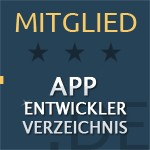
Insight

Insight

Insight
The best Flutter packages: My 5 favorites for successful app development


Julian Giesen
·
·
Monday, March 25, 2024


Julian Giesen
The use of Flutter packages is essential in every Flutter development and plays a crucial role in the design and functionality of apps. Flutter packages offer a wealth of pre-built modules, tools, and functions that help developers save time and create high-quality applications. As an experienced app developer, I know how important it is to choose the right packages to increase productivity while improving code quality.
In this post, I would like to introduce my personal favorite Flutter packages that have supported me in numerous projects. From state management to error handling, these packages provide a wide range of solutions for common development challenges. Each package brings its unique benefits and features, making development more efficient and enjoyable. From optimizing the development process to enhancing the user experience, these packages offer a variety of ways to extend Flutter apps ideally.
My 5 favorite Flutter packages at a glance
I have put together a small selection of Flutter packages that I consider essential for developing high-quality apps. Each of these packages has unique features that optimize my development process and improve the quality of my apps.
bloc/flutter_bloc: The bloc package provides the implementation of the Business Logic Components (BLoC) pattern in Flutter. With flutter_bloc, developers can achieve a clear separation between UI and business logic, improving the scalability and maintainability of their apps. It simplifies state management and responsiveness to user interactions.
freezed/freezed_annotation and json_serializable/json_annotation: These packages facilitate the simple serialization and deserialization of Dart objects, which is particularly useful when exchanging data between the app and an external API. Freezed and json_serializable offer a clean and efficient way to define and automatically generate data models, helping developers save time and minimize errors.
talker_flutter: talker_flutter is a powerful package that simplifies error handling and logging in Flutter apps. With the package, developers can quickly and effectively identify, debug, and fix errors, improving the stability and reliability of their apps. It offers a comprehensive logging feature that helps developers monitor the state of their apps and identify potential issues early.
cached_network_image: cached_network_image is a useful package for efficiently displaying images from the network in Flutter apps. It provides automatic caching of images, reducing loading times and improving app performance. With this package, developers can seamlessly integrate images into their apps while optimizing bandwidth usage.
get_it and injectable: These packages offer powerful dependency injection (DI) solutions for Flutter apps. With get_it and injectable, developers can efficiently manage and inject dependencies between different modules of their apps. They enable a flexible and maintainable architecture that enhances the scalability and testability of the apps.
Freezed and JSON Serializable: The Power of Serialization
The serialization of data is a common step, especially when it comes to exchanging data between different components of the app or with external APIs. The packages freezed/freezed_annotation and json_serializable/json_annotation simplify the serialization of data.
Explanation of freezed/freezed_annotation and json_serializable/json_annotation
Freezed is a powerful package that facilitates the generation of immutability classes. It provides a simple syntax for defining data models and automatically generates the corresponding code for immutability. This significantly eases working with immutable data structures and minimizes the risk of errors.
import 'package:freezed_annotation/freezed_annotation.dart';
part 'user.freezed.dart';
@freezed
abstract class User with _$User {
const factory User({
required String name,
required int age,
}) = _User;
}JSON Serializable is another useful package that simplifies the serialization of Dart objects into JSON. By using the annotations @JsonSerializable(), developers can quickly and easily define data models that can be seamlessly converted to JSON. This saves time and minimizes the manual effort required for serializing and deserializing data.
import 'package:json_annotation/json_annotation.dart';
part 'user.g.dart';
@JsonSerializable()
class User {
final String name;
final int age;
User({required this.name, required this.age});
factory User.fromJson(Map<String, dynamic> json) => _$UserFromJson(json);
Map<String, dynamic> toJson() => _$UserToJson(this);
}Why are they important for Flutter app development?
The use of freezed and JSON Serializable brings several advantages for Flutter app development. First, they provide a consistent and clean way to define and manage data models, improving the readability and maintainability of the code. Second, they minimize the risk of errors and ease debugging, as the generated code is of high quality and repetitive tasks are automated.
Practical use cases and examples
A practical use case for using freezed and JSON Serializable would be the implementation of a user registration function in an app. By using freezed, an immutable user data model can be defined, ensuring the integrity of user data. JSON Serializable enables the conversion of user data into JSON to store it on a server or in a local database.
void registerUser(User user) {
// Convert user to JSON
final json = user.toJson();
// Send JSON data to server
// ...
}Overall, freezed and JSON Serializable provide powerful solutions for data serialization in Flutter apps. Their simple syntax and automation features significantly improve the efficiency and quality of development.
Talker Flutter: Error Handling and Logging
talker_flutter is a practical Flutter package for developers that provides a comprehensive solution for error handling and logging in Flutter apps.
Introduction to talker_flutter and its features
talker_flutter offers a user-friendly API that allows developers to identify, debug, and fix errors, along with comprehensive logging features that make monitoring app status easier. By integrating talker_flutter into their app, developers can accelerate the development process and make their application more stable.
How does it improve error handling and logging?
talker_flutter improves error handling and logging in Flutter apps in several ways. First, it allows efficient capture and logging of errors, making diagnosis and resolution of issues easier. Second, it provides a central platform for managing logs and events, facilitating app status monitoring and performance data analysis. Third, it eases the integration of error reports into external tools or services for further analysis and optimization.
// Beispiel für die Verwendung von Talker_flutter zur Protokollierung eines Benutzerereignisses
Talker.logEvent('UserLoggedIn', {'userId': '12345', 'timestamp': DateTime.now()});Use cases and best practices
An example of using talker_flutter is the implementation of a custom error handler. With talker_flutter, errors can be captured and documented in real-time to ensure comprehensive error analysis. In addition, custom logs can be defined to monitor and analyze important app events.
// Beispiel für die Verwendung von Talker_flutter zur Fehlerbehandlung
try {
// Code, der potenziell einen Fehler verursachen kann
} catch (error, stackTrace) {
Talker.handleError(error, stackTrace);
}Best practices when using talker_flutter include integrating the package into the entire development cycle of the app. By implementing error handling and logging early, potential issues can be identified and resolved before they impact the user experience. Additionally, custom events and logs can be strategically utilized to capture and analyze important app metrics.
Overall, talker_flutter is an extremely useful Flutter package that takes error handling and logging in Flutter apps to the next level. With its user-friendly API and comprehensive features, it is an indispensable tool for any Flutter developer looking to create high-quality and stable apps.
get_it and injectable: Efficient Dependency Injection for Flutter Apps
Dependency Injection (DI) is an essential concept in software development that improves the modularity, testability, and maintainability of applications. The Flutter packages get_it and injectable offer powerful solutions for DI in Flutter apps.
What are get_it and injectable?
get_it and injectable allow for the injection of dependencies between different modules and classes in the app, making it easier to develop complex applications. By using these packages, developers can create a clearly structured and maintainable architecture for their apps.
// Beispiel für die Registrierung einer Abhängigkeit mit get_it
final myService = MyService();
GetIt.instance.registerSingleton<MyService>(myService);Why are get_it and injectable important for Flutter apps?
get_it and injectable enable loose coupling between different components of the app by dynamically injecting dependencies, thereby increasing the flexibility and maintainability of the code. Furthermore, they facilitate testing of apps, as developers can easily create interchangeable mock implementations for dependencies.
// Beispiel für die Verwendung von injectable zur Registrierung von Abhängigkeiten
@module
abstract class RegisterModule {
@lazySingleton
MyService get myService => MyService();
}Use cases and best practices
A practical use case for using get_it and injectable is the implementation of a service locator pattern in a Flutter app. By registering and injecting dependencies through these packages, a clear separation between the different layers of the app can be maintained, improving maintainability. Additionally, these packages make it easy to integrate dependency injection into existing Flutter projects and scale the app across different platforms.
// Beispiel für die Implementierung eines Service-Locator-Patterns mit get_it und injectable
// Service-Klasse
class ApiService {
Future<void> fetchData() async {
// Daten von der API abrufen
}
}
// Registrierung der Abhängigkeit mit get_it
final locator = GetIt.instance;
locator.registerLazySingleton<ApiService>(() => ApiService());
// Verwendung des Service im Widget
class MyWidget extends StatelessWidget {
@override
Widget build(BuildContext context) {
// ApiService aus dem Locator abrufen
final apiService = locator<ApiService>();
return Scaffold(
appBar: AppBar(
title: Text('Service Locator Beispiel'),
),
body: Center(
child: ElevatedButton(
onPressed: () async {
// Daten von der API abrufen
await apiService.fetchData();
},
child: Text('Daten abrufen'),
),
),
);
}
}Conclusion
From efficient data management with freezed and json_serializable to improved error handling and logging with talker_flutter and efficient dependency injection with get_it and injectable, the showcased packages offer a variety of features and benefits for developing high-quality Flutter apps.
The selection of packages should also focus on optimizing the development process, improving code quality, and maximizing user experience. With the right selection and integration of these packages, developers can save time, increase the maintainability of their apps, and ultimately create better products for their users.
As an experienced Flutter developer with extensive knowledge of selecting and implementing the right packages, I am happy to assist you in supporting your team and advancing the development of your app.
All insights
All insights
“Flutter and the related logo are trademarks of Google LLC. We are not endorsed by or affiliated with Google LLC.”
“Flutter and the related logo are trademarks of Google LLC. We are not endorsed by or affiliated with Google LLC.”
Copyright ©2025. Julian Giesen. All rights reserved.
“Flutter and the related logo are trademarks of Google LLC. We are not endorsed by or affiliated with Google LLC.”






